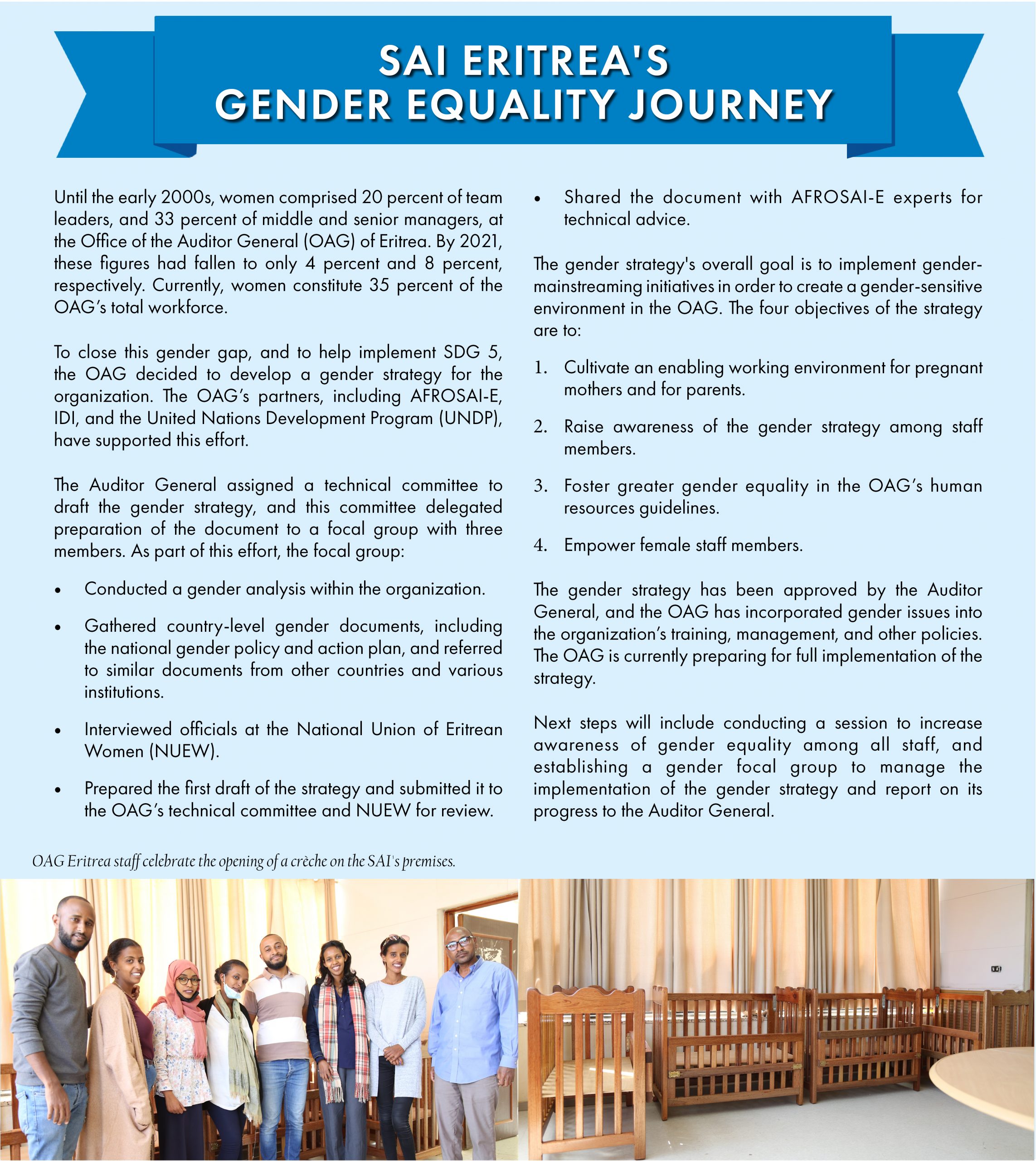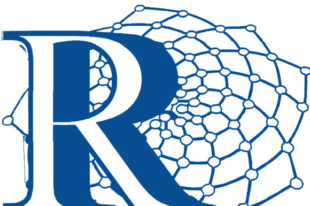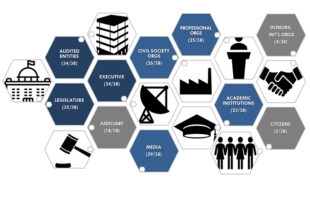AFROSAI-E Supports SAIs in Becoming Gender-Responsive Organizations
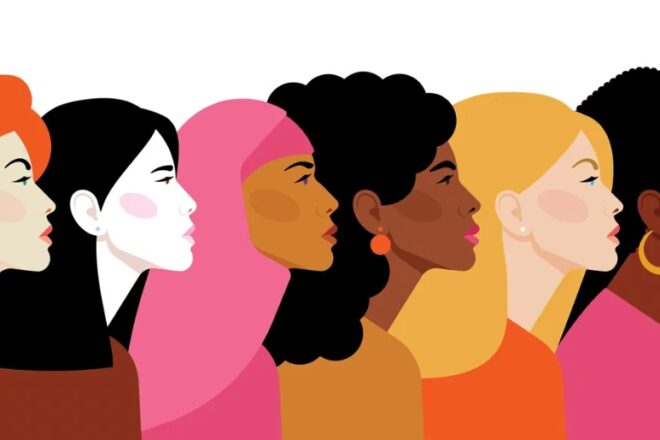
by Marianna van Niekerk, Manager – HR, Organizational and Leadership Development, AFROSAI-E
In 2020, the African Organization of English-speaking Supreme Audit Institutions (AFROSAI-E) embarked on a journey to support the region’s SAIs in their efforts to strengthen gender equality. The two main objectives of this initiative were to help SAIs become gender-responsive organizations, and to build the capacity of SAIs to conduct audits that contribute to gender equality.
Gender Video
The first step in this initiative was to create a video providing SAIs with useful information and resources related to gender equality. According to the United Nations, Sustainable Development Goal 5 (Achieving gender equality and empowerment for all women and girls) is “not only a fundamental human right, but a necessary foundation for a peaceful, prosperous, and sustainable world.”
However, the 2019 Africa Gender Index revealed an overall gender gap of 51.4 percent in the region (a score of 0 represents total inequality, while a score of 100 indicates perfect equality between women and men). The video outlined ways in which AFROSAI-E members can narrow this gender gap by becoming gender-responsive organizations.
The video explains that gender-responsive SAIs afford equal opportunities, benefits, and outcomes for both women and men. To achieve this goal, SAIs need:
- A vision, values, strategy, and mandate that reflect a gender perspective.
- Infrastructure, resources, policies, regulations, and procedures that promote gender equality.
- Managers who take responsibility for gender equality.
- An organizational culture with space for women and men to bring their views to the fore.
- Human resources policies and processes that articulate gender equality.
Achieving gender diversity and inclusion can have many positive effects for SAIs, helping them to:
- Attract more qualified and skilled women, as well as younger employees, who seek gender-responsive employers.
- Retain women more successfully.
- Boost the organization’s reputation and gain the confidence of development partners and donors.
- Enhance teams’ creative thinking.
- Improve wellbeing of staff and the organizational culture.
The video provides SAIs with specific steps and building blocks that can help them become more gender responsive. These include incorporating gender equality into human resources policies and processes aligned with the employee lifecycle, such as recruitment, benefits, compensation, performance assessment and recognition, training and professional development, and advancement.
Gender Assessment
The second step in this initiative was to conduct a gender assessment of AFROSAI-E members in August 2021. The assessment examined SAIs’ political will, organizational culture, leadership commitment, staff awareness, and readiness, as well as the extent to which SAIs mainstream gender equality in human resources policies and collect gender statistics at all staff levels. Eighteen of the 26 SAIs in the region participated in this exercise.
The assessment found that overall, men comprised 66 percent, and women 34 percent, of the staff of respondents. The biggest challenges these SAIs faced in becoming more gender responsive were organizational strategies that did not define gender equality goals, as well as insufficient technical, financial, and human resources to implement a gender strategy.
The assessment, as well as the AFROSAI-E Institutional Capacity Building Framework 2020 survey, also looked at the extent to which SAIs had developed and implemented a gender policy. Only five had implemented a gender policy to their full satisfaction. Eight SAIs had developed a gender policy but thought it needed improvement, and 13 SAIs did not have a gender policy.
Gender Equality Workshop
The third step in the initiative was to hold an online workshop on gender equality on September 21, 2021, with more than 130 participants from the AFROSAI-E, Arab Organization of SAIs (ARABOSAI), and Organization of Latin American and Caribbean SAIs (OLACEFS) regions. At the workshop, an impressive group of gender experts and program officers from the AFROSAI-E region, INTOSAI Development Initiative (IDI), and Canadian Audit and Accountability Foundation (CAAF) discussed the gender assessment’s findings and potential solutions. One of the highlights of the workshop was when SAI Eritrea shared its journey to develop a gender strategy (see spotlight below).
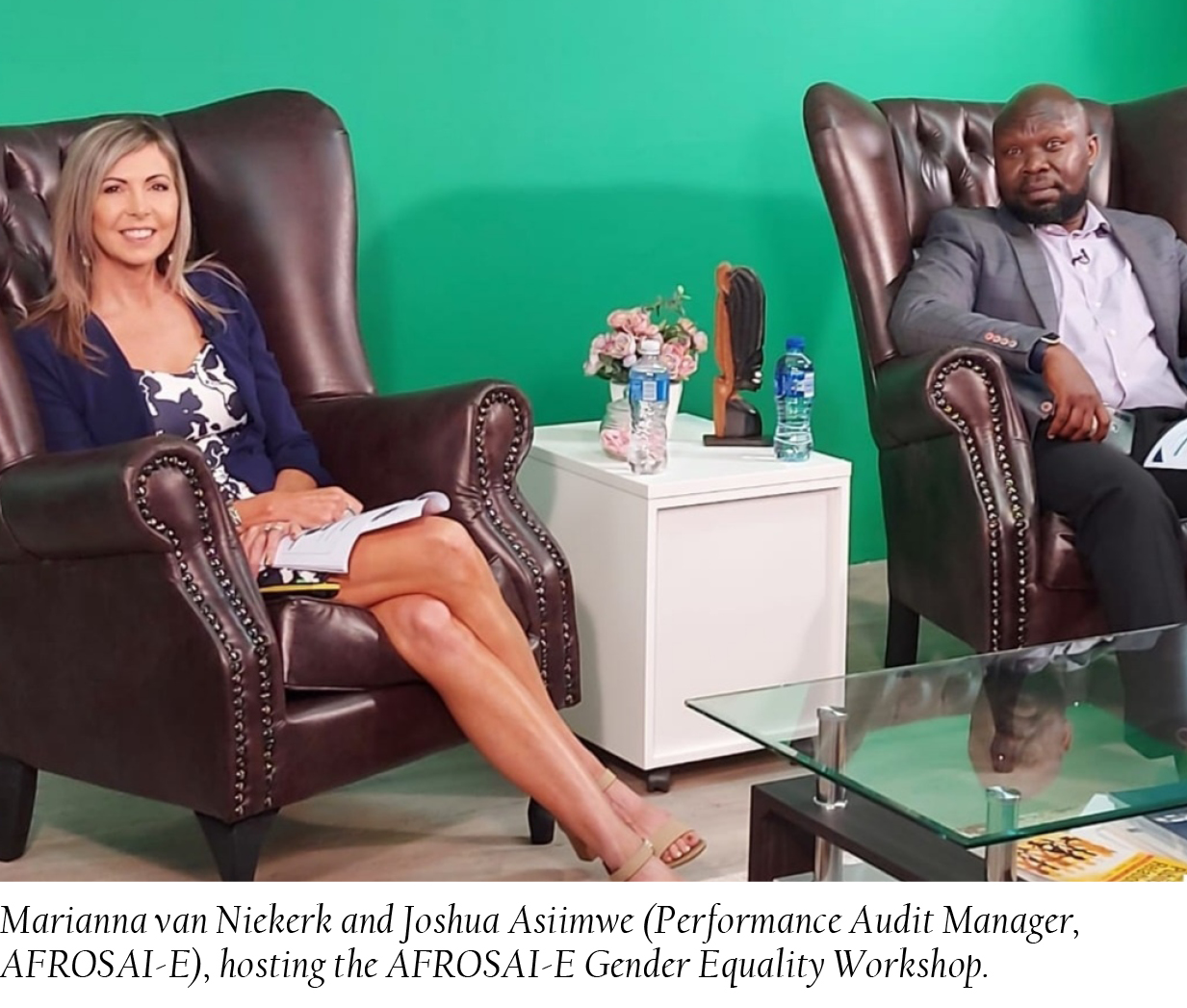
The workshop, which aimed to raise awareness of gender equality and share AFROSAI-E’s commitment to support members in becoming gender-responsive organizations, was the first of many discussions on this exciting topic. In 2022, AFROSAI-E will focus on training human resources practitioners and strategy experts at the SAIs of Eritrea, The Gambia, and Rwanda to develop and implement a gender policy. AFROSAI-E would like to thank all the SAIs, sponsors, development partners, human resources practitioners, and specifically IDI and CAAF for their contributions to the success of the project. For more information about AFROSAI-E’s gender equality initiative, please email Marianna van Niekerk at marianna@afrosai-e.org.za.
